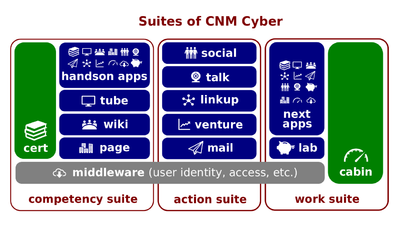What Report Complete Is
Revision as of 18:48, 13 November 2020 by Gary (talk | contribs) (Created page with "400px|thumb|right|[[CNM Cyber suites]]What Report Complete Is (hereinafter, the ''Lectio'') is the lesson part of '''Technical Report...")
What Report Complete Is (hereinafter, the Lectio) is the lesson part of Technical Report Essentials lesson that introduces its participants to technical report concepts. This lesson belongs to the CNMCT Entrance section of the CNM Cyber Placement.
Content
The predecessor lectio is What Reporting Is.
Script
- A report is a description of events, or a lack of those, or a state of affairs that recipients of the report either requested or are willing to know. Reporting refers to those endeavors that are undertaken to produce one or more reports; however, not everyone who produces reports is a reporter.
- Reporters discover data related to news events and report that reportable data to mass media such as TV and news websites. However, those individuals who are not called reporters produce fewer reports than those who are formally not reporters.
- Accountants and financial managers produce financial reports that reflect financial data and financial standing of some entity. Top managers have to report to the stockholders and the governments. Engineers, managers, and operators describe standing of equipment, logistics, orders, production, supplies, and other operational data. Sales representatives report about their interactions with the customers. Scientists report their research findings. Reporting is an essential part of pretty much any occupation.
- Three properties separate reports from casual communication messages. First of all, reports are factual; they represent facts rather than opinions or speculations. Secondly, reports are targeted. They address their particular audiences. Report completeness is the final property. Good reports are as complete as their completeness is possible and needed.
- Various question sets have been created to make sure that the reported data is complete. Rudyard Kipling established one set in a short poem,
I keep six honest serving men
(They taught me all I knew);
Their names are What and Why and When
And How and Where and Who.
- Collectively, the question words who, what, when, where, why, and how are sometimes called Kipling Questions. 5W1H can also be used since five of these question words start with W and one with H. When some data is missing, a complete report would mention that. For example,
The event timing is yet to be decided.
- Aristotle proposed the first known question set that also included the with what question. Thomas Aquinas summarized Aristotle's set in that way:
For in acts we must take note of who did it, by what aids or instruments he did it (with), what he did, where he did it, why he did it, how and when he did it.
- The other sets may include additional Ws and Hs for metadata like who reported, and a few other. Again, the report completeness doesn't assume that all imaginable questions are addressed.
- Report completeness assumes that the required, requested, and/or needed data is included. In the United States, for instance, the law establishes what financial reports any taxpayer must submit to IRS. These reports don't address how and why questions directly, but include income data at very least.
- In our digital age, electronic devices produce the overwhelming majority of reports automatically. For instance, the computing servers of CNM Cloud routinely report to WorldOpp Middleware and the middleware reports its data back to the servers upon their requests. Each time you click on any website, your web browser reports your click to web servers. Traffic reports may aggregate millions of reports produced by GPS-powered equipment, cameras, and other sensors.
Key terms
- Report, reporting, reporter, reportable data, report completeness, question set, Kipling Questions, 5W1H
Closing
The successor lectio is Narrated Fact vs Opinion.
